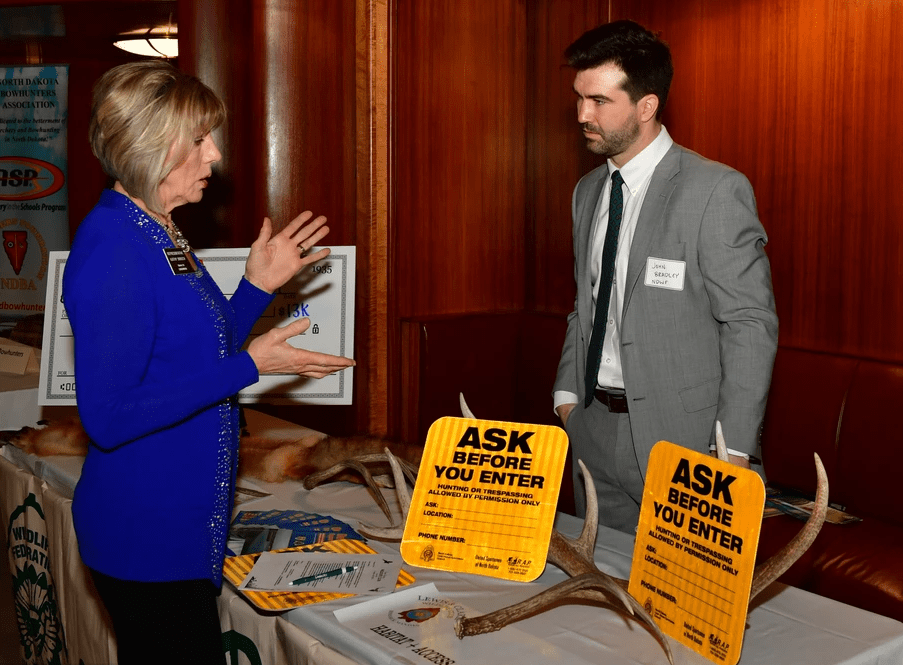
The author discusses conservation and access issues with a politician during the North Dakota legislative session. Knowing how to frame an issue and why it’s important to you are some of the first steps in getting political and influencing legislation. DEO Photo by John Bradley.
By John Bradley
Hunters in North Dakota circle the first Friday in November on their calendars every year, while politicians circle the second Tuesday of November – election day. For hunters, excitement for the deer gun opener starts well before the season. When primary elections are occurring in June, hunters are eagerly awaiting their draw results. While candidates campaign all summer and fall, hunters scout their unit, hang trail cams, secure permission from landowners and fine tune their equipment.
Just a few days after the deer gun opener, North Dakotans will head to the polls to vote. Just like the hunter who spends their time scouting, voters should educate themselves on the candidates running for office. Better yet, they should reach out to candidates – both incumbents and challengers – and ask them questions on the issues impacting North Dakota hunters and anglers. Politicians can have a huge effect on public and private land access, the maintenance of critical habitat, the funding of the Game & Fish Department, and a whole host of other issues impacting North Dakota’s hunters and anglers.
Here are a couple tips for talking to a politician about the issues outdoor enthusiasts care about.
Know your Politician
The first thing to do is find out who currently represents your district. For the state legislature, you can find your elected officials for your district here. To find information for a candidate running for an office in your district go directly to their campaign website for their contact information. Every interaction with your politician or prospective elected official should be respectful. Respect allows your voice to be heard.
Open with Agreement
Your goal is to connect and persuade. Politicians are used to people contacting them only when they are upset. If you start out by telling them everything, they have done wrong, they will likely tune you out before they hear what you have to say. A good way to begin a conversation is to offer a values statement that they agree with, the topic does not have to be hunting or fishing related. Talk to them about kids or grandkids, Bison football, North Dakota weather or anything else that forms a connection. After they are listening, then you can go into details about the issue important to you and what you are asking them to do.
Connect your Why and Tell your Story
When it comes to the big issues, start with why. What issue are you concerned about and why do you care about it? Connect your “why” to broadly held values like freedom, opportunity, protecting wildlife, and ensuring that future generations (those kids and grandkids) will have equal or better opportunities to hunt and fish. Don’t be afraid of moral absolutes. For example: “We should manage wildlife based on facts, data, and science, not the political winds of the day.” Use your “why” to illuminate the facts so that they stand out.
Talking with a politician is more of an art, than a science. Use your instincts. Explain why you care about the issue in plain language. It is one thing to show a photograph of your kid with their first deer but linking the photograph to the PLOTS program where your kid harvested the deer has a much greater impact.
Make Your Case
While a strong personal story is often necessary to bring a large issue down to ground level where a candidate or elected official can make a connection, it will not usually be enough to influence policy. Know the facts and rationale that support your story and the stories of others who have had similar experiences.
Close Strong
Repeat your main takeaway. Be very clear with your opinion and your why. Do not be afraid to tell them what you already told them; repetition helps create a memory. Even if you did not vote for the elected official, they still represent you and you can voice your concerns to them anytime. Finally, end with gratitude. Remember to thank them for their time, every time.
While there is no guarantee you will always get the issue “win” you are hoping for when you contact a politician, with these tips and tactics, there is a much higher likelihood you will make a positive impact for your cause, while also maintaining respect from your elected officials. It also sets the stage for future conversations with your elected officials when another issue needs their attention. Sportsmen and women can make a big impact on wildlife policy when they are willing to use their voice and their vote.
John Bradley is a Dakota Edge Outdoors contributing writer and the Executive Director and chief lobbyist for the North Dakota Wildlife Federation.
